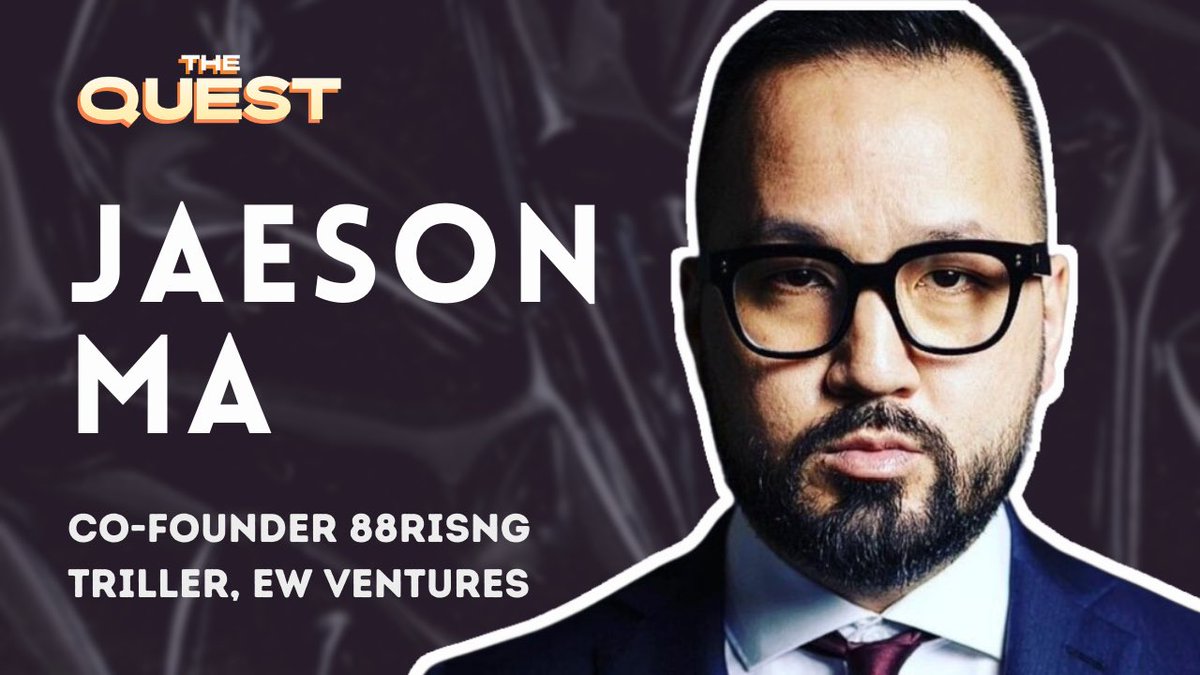We are halfway through April, where we are celebrating Asian icons on @thequest_pod to #stopAAPIhate.
I want to bring back this gem from the archive w/ @jaesonma and his crazy stories: kicking it with @JLin7, working for @MCHammer, and founding @88rising.
[A video thread]
I want to bring back this gem from the archive w/ @jaesonma and his crazy stories: kicking it with @JLin7, working for @MCHammer, and founding @88rising.
[A video thread]
The #linsanity story is my favorite.
@jaesonma met @JLin7 before his big play for the @nyknicks. The young Jeremy was nervous: JMA thought he might get dropped.
Everything changed in MSG. 'You could feel the electricity. This was an AA moment 🇺🇸'
@jaesonma met @JLin7 before his big play for the @nyknicks. The young Jeremy was nervous: JMA thought he might get dropped.
Everything changed in MSG. 'You could feel the electricity. This was an AA moment 🇺🇸'
Seeing @JLin7 walk into the locker room, @jaesonma held prayers.
'[He was] glowing. Like a young David who just killed the Goliath.'
In a few weeks, #linsanity took over the world by storm.
'When one Asian talent breaks out, it changes the world.'
'[He was] glowing. Like a young David who just killed the Goliath.'
In a few weeks, #linsanity took over the world by storm.
'When one Asian talent breaks out, it changes the world.'
#Linsanity was a sign of God. @jaesonma knew he needed to start right away.
Through iterations and pivots, @88rising was born. The new Disney of Asian hip-hop.
From Rich Brian to Joji, JMA helped unleash a wave of creative Asian talents worldwide.
Through iterations and pivots, @88rising was born. The new Disney of Asian hip-hop.
From Rich Brian to Joji, JMA helped unleash a wave of creative Asian talents worldwide.
But that's not the whole story. How did @jaesonma get into media and tech?
His mentor was @MCHammer himself.
Seeing a 17-yo JMA working at a youth church, Hammer had a simple proposition.
'Why don't you quit your job and come work for me?'
His mentor was @MCHammer himself.
Seeing a 17-yo JMA working at a youth church, Hammer had a simple proposition.
'Why don't you quit your job and come work for me?'
You guessed it, @jaesonma did it in a heartbeat.
He drove @MCHammer around, going to @ycombinator events, meeting @Twitter and @YouTube founders before they made it.
He was way before the tech curve, ready for an investor career later on (@triller).
He drove @MCHammer around, going to @ycombinator events, meeting @Twitter and @YouTube founders before they made it.
He was way before the tech curve, ready for an investor career later on (@triller).
But founding and investing in companies is boring. @jaesonma is a hip-hop diehard fan at heart.
His first album was packed with Christian raps. Sermons over beats and spoken words.
His collaborator? Featuring no one else but @BrunoMars himself.
🤯
His first album was packed with Christian raps. Sermons over beats and spoken words.
His collaborator? Featuring no one else but @BrunoMars himself.
🤯
Liked this video thread? This is one of my favourite conversations at @thequest_pod and what keeps me going.
You can check out the full episode with video on The Quest YouTube channel: .
Subscribe for new video drops every Tuesday!
You can check out the full episode with video on The Quest YouTube channel: .
Subscribe for new video drops every Tuesday!

If you prefer podcasts instead, here's a link to the episode: justinkan.club/feed/jaeson-ma…
Drop me a review on iTunes! I read all of them.
Drop me a review on iTunes! I read all of them.
Short on time? Check out a written chronology of JMA adventures with takeaways.
thequestpod.substack.com/p/the-quest-di…
Subscribe to my weekly for everything from The Quest, tech to wellness musings.
Hope you liked this thread!
thequestpod.substack.com/p/the-quest-di…
Subscribe to my weekly for everything from The Quest, tech to wellness musings.
Hope you liked this thread!
• • •
Missing some Tweet in this thread? You can try to
force a refresh






